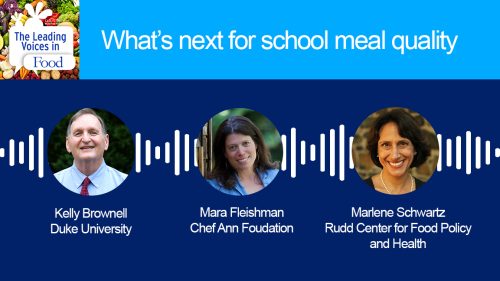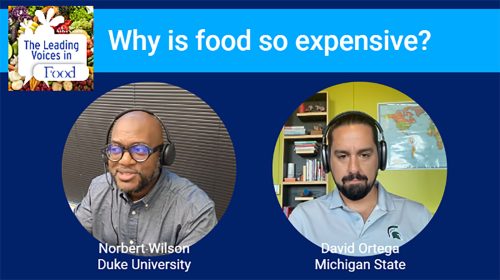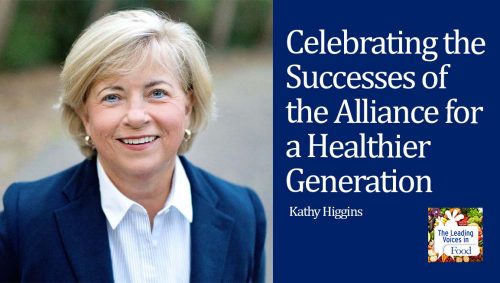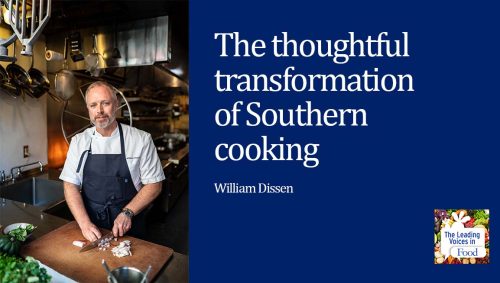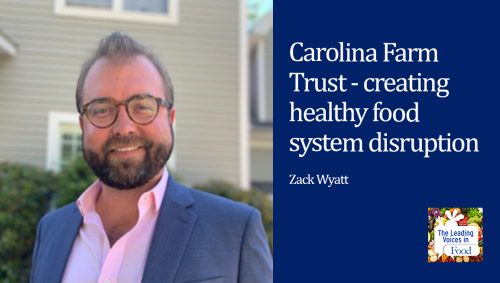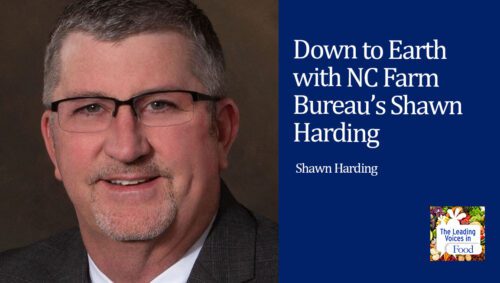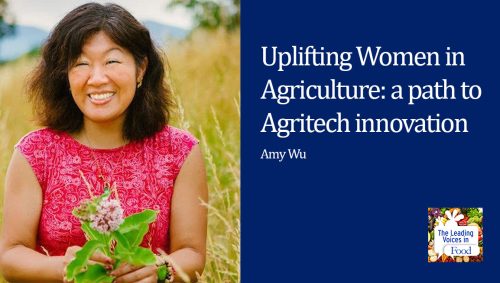The Leading Voices in Food
E184: Carolina Farm Stewardship Association – Connecting Farmers & Communities
Today we’re speaking with Roland McReynolds, Executive Director of the Carolina Farm Stewardship Association which is a member-based farmer-driven, non-profit organization based in Pittsboro, North Carolina, that helps farmers and consumers in both North and South Carolina grow and eat local organic food.
Subscribe: Apple Podcasts | TuneIN | YouTube Music | SoundCloud | PocketCasts | Radio Public
Tags: Agriculture & Tech | Community & Economic Development | COVID-19 Pandemic Impacts on Food | North Carolina | Voice of Farming |

Roland McReynolds has served since 2007 as the Executive Director of the Carolina Farm Stewardship Association (CFSA), a member-based, farmer-driven non-profit organization based in Pittsboro, NC that helps farmers and consumers in the North and South Carolina grow and eat local organic food. He is an attorney, receiving BA and BS degrees from the University of Missouri-Columbia, and his JD from the UNC-Chapel Hill School of Law. Roland directs CFSA’s programs and policy advocacy work at the state and federal level, and has served on the USDA’s Fruit & Vegetable Industry Advisory Committee; the Policy Committee of the Organic Farmers Association; the National Sustainable Agriculture Coalition’s Organizational Council; and the Advisory Boards for the North Carolina A&T State University College of Agriculture and Environmental Science and the North Carolina State University Department of Crop and Soil Science; among other boards and committees. Carolina Farm Stewardship Association is the oldest and largest organic farmers organization in the Southeast. CFSA hosts educational conferences and events on sustainable agriculture and local food systems; provides training and direct technical assistance to local organic farmers; runs a training farm for new organic growers in Concord, NC; coaches food councils on effective policy advocacy; and represents organic and local food systems stakeholders with state and federal legislators and agencies. In response to COVID, CFSA has been operating a program called FarmsSHARE, a CSA-style food box program that addresses food insecurity in the Carolinas by purchasing food from small farms at a fair price and distributing that food to people in need through a statewide network of community-based food hubs. For more information about CFSA, visit www.carolinafarmstewards.org.
Interview Summary
So why don’t we begin with this. Can you help listeners understand what the Carolina Farm Stewardship Association does?
So our vision is a sustainable regional food system that is good for all consumers, good for farmers, good for farmworkers, and good for our ecosystems. So to achieve that vision, we work with farmers and with communities to advocate, educate, and build connections that support sustainable food systems in the Carolinas, centered on local foods and organic agriculture. We do that by working and consulting directly with farmers to help them implement organic practices in their operations and to help them expand their market opportunities. We work with food hubs and other sorts of food businesses to strengthen their operations so that they can become reliable market outlets for small farms and improve their competitiveness and ability to connect with values-driven buyers. We provide education and training both for farmers and the public. For instance, we host the largest organic farming and food system conference in the Southeast which this year is actually taking place in downtown Durham, November 6 through 8, 2022. We also run a farm incubator facility in Concord, North Carolina to help new organic farmers learn the trade and become successful in moving into organic farming as a career. We do consumer outreach, such as our Piedmont Farm Tour event here in the Piedmont Triangle area in North Carolina and K-12 agriculture education. We do a lot of advocacy educating state and federal policy makers on the needs and concerns of sustainable farmers. And, training people at the local level on how they can be effective advocates for healthy and just food systems.
Thank you for that description in this sort of remarkably broad portfolio you have. I can imagine how busy you folks are! But let me ask a question of kind of a national scope. Are there other organizations like this around the country, and is there a coalition of such groups?
Absolutely. Many states have sister organizations, like Carolina Farm Stewardship Association, serving their communities and their regions. One national umbrella group that we’re a part of is the National Sustainable Agriculture Coalition, which acts as a lobbying voice for our sector in Washington DC. Their members span all the way across the country. So similar types of organizations that we work with are in states everywhere, like the Northeast Organic Farmers Association in New England, Community Alliance for Family Farms in California, and everywhere in between.
So let’s go back in time and speak about how the association got started. So what were its origins, why did people think there was a need for this, and who are the members?
Essentially, it was a group of organic farmers and gardeners who got together back in 1979 seeking to practice organic farming, and to gain opportunities to learn about how to grow organically. And who wanted to see a food system that was re-centered on communities and relationships and shifted away from a commodity mindset of the cheapest food grown using practices that were focused on extraction from the natural world. These were farmers and gardeners who wanted to work with the natural world and work with their neighbors to create a different vision for a food system. This is the late 1970s, and this was during the “Get Big or Get Out” mindset in agriculture. In fact, existing agricultural institutions, universities, companies, were really actively hostile to organic. It was really to create that peer-to-peer learning opportunity for farmers across North and South Carolina that CFSA originally began. Over the years, the initial project of the organization actually came to be an organic certification agency. Back before there was the green organic seal that we have in the grocery stores today, the organic label was something that was locally defined. There wasn’t a national program. So these farmers got together and decided and collectively created organic standards for helping them to manage their farms in a way that was beneficial to the environment that promoted healthy living soils. And over time, as we’ve expanded, and as the movement has expanded, those farmers recognized the need for policy advocacy and policy change to promote more sustainable food and farming systems, and to expand our services so that we can encourage and promote new farmers to get into organic agriculture and local food.
Now that you explained the origins of the organization, I was first going to say it was the beginnings of a trend for people and farmers to become more in touch with one another through things like farmer’s markets and local produce programs and farm-to-school programs, things like that. But it wasn’t a new trend. It was sort of the restoration of what existed before when people were more in touch with the farmers who grew their foods, and that connection between farmers and their communities is a really interesting one. And I’d love to hear your thoughts on the role that farmers can play in addressing economic and social justice issues in their communities.
Absolutely. A really great example of how the sustainable agriculture and sustainable farming community in the Carolinas is doing just that today is our FarmsSHARE Program which was developed as a COVID response by Carolina Farm Stewardship Association back in 2020. Initially, we saw with the pandemic and the public health controls that were being put in place, saw restaurants closing and especially those farm-to-table restaurants that were buying food from small local farms in our region and across the country. So those farmers all of the sudden lost a market, and they already had crops in the ground ready to sell, and the restaurants were laying off their workers. And, you know, this predominantly is people working in the kitchens and in the service industry who tend to more likely come from oppressed backgrounds, and they didn’t have money because their jobs were getting cut off. So our FarmsSHARE program initially was created to provide CSA-style boxes from those small farms to those restaurant workers who were unemployed, or underemployed, as a result of the pandemic. Thanks to some very generous funding from the Blue Cross Blue Shield Foundation of North Carolina, CFSA was able to buy that food from those small farms. They then worked with local food hubs to have it packed, and then the food hubs delivered the food to the restaurants that they used to sell to so that the workers could have this free, fresh, healthy food. As the pandemic has evolved and revealed to a wider population, the realities of food insecurity in our communities across North and South Carolina, FarmsSHARE evolved to address people throughout society who are in need of fresh, healthy food. So the way FarmsSHARE works right now is that we provide funding to food hubs for them to purchase food directly from small farms, package that up, again, into CSA-style, (Community Supported Agriculture) boxes. And then take that to food pantries in their own communities and senior centers in their own communities so that small farms are, through this program, feeding people in need in their backyards. This is a great example of what happens when we marshal many small farms to work together to address the injustices in the food system in their own communities, and bring healthy food made in harmony with nature to the people that deserve it.
Well, it’s a great example of ingenuity. It’s a great example of the resilience of a local food system and how people can come together in times of crisis, and the FarmsSHARE program you talked about is really interesting. Do you think that the lessons have been learned about how these food systems can be resilient so if something like this happens again, let’s hope it doesn’t, but if it does, that we’ll be able to respond even more quickly and effectively?
I think we have an opportunity to help people learn that lesson. I mean, there’s no doubt we have seen examples of fragility of the national and international food systems as a result of COVID, and we’ve seen examples of local food systems being resilient. As a professor and instructor, you probably appreciate that learning doesn’t just happen from experiencing it once. We have to keep pushing and keep sharing those examples. This is really where the role of policy becomes vital in terms of ensuring that our society learns these lessons. The Farm Bill is coming up, which is the massive five-year legislation that Congress brings about every few years that guides food and agriculture policy in this country. That is a crucial opportunity for advocates of resiliency in our food system to make sure that these lessons actually get ensconced in policy. That policies that direct and incense the production and distribution of food in this country are built to be resilient instead of to be commodified.
Well, so let’s talk about the Farm Bill. We’ll turn our attention a little bit from the local picture to the national one. So this is an enormous and enormously complex piece of legislation and, as you said, it’s coming up for renewal. So what do you think the legislation can do to help support local and regional food systems, and what do you think the policy reforms might be for the 2023 Farm Bill?
It really is a crucial opportunity, and one of the places that can start is in food procurement policies within USDA programs. So when it comes to food purchasing that the government does for relief to address food insecurity, the primary metric for making those purchases, is how cheap is the food? We need to change that mindset. We need to change policy to allow for these systems to prioritize community development and supporting farmers as well as supporting communities. So, for instance, there is a proposed bill that’s out there in Congress right now, the Fresh Produce Procurement Reform Act, that is an example of policy that we’d like to see incorporated into the next Farm Bill that would lower the barriers for small farms to participate in these feeding programs. And would allow the agencies that run these programs to make decisions based, not just on getting the cheapest possible food and calories for people who need it, but to actually allow them to get fresh and healthy food and do it in a way that builds community instead of extracts from communities. That’s a crucial area of reform. Incenting, agroecological and conservation practices, and promoting more research on organic practices is also something that is a critical opportunity in this upcoming farm bill. There is so much that farmers do that is shaped by the policies that the farm bill puts out. The Farm Bill, as it exists right now, eliminates most of the risk for very large farms to just grow corn and soybeans, and to not worry about the environments. Changing those incentive structures, making it possible, and in fact, desirable for farmers to work in harmony with nature as a primary focus and as a primary benefit of their operations has to be a part of the kind of reform that’s needed.






